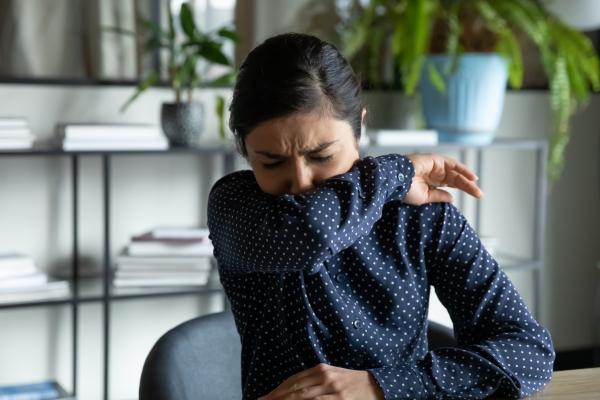Sneeze quietly yes or no? Many times you notice that a sneeze is going to come and you try to suppress that reflex action, usually because it is too loud and you do not want to attract attention. But what is really a sneeze? Well, it is a reflex action, an expulsion of air that occurs suddenly, involuntarily and also, why not say it, abruptly. Sneezing occurs in response to irritation of the mucous membranes of the nose or throat and although it usually occurs individually, some people tend to suffer from two by two, three by three or even an attack of sneezing beyond 3 times. Thanks to it, the respiratory tract is cleaned, so it can be considered that sneezing is good. However, sneezing hard or sneezing a lot can be “frowned upon”.

What you should know before sneezing without making noise
A sneeze is a reflex action by which air is expelled from the lungs through the nostrils and, occasionally, through the mouth. And why does a sneeze occur? Generally it is a response to a physical, chemical, infectious or allergic agent or factor in such a way that the body defends itself from said external attack. In this way, you must understand that a sneeze is a good thing: it drags both germs and irritating particles to the outside , avoiding damaging our tissues. Therefore, before suppressing a sneeze, it is necessary to know that this sudden act is natural and beneficial for you. Next, we tell you curiosities that you should know before sneezing without making so much noise :
- It is a reflex and natural act through which not only air is expelled, but also nasal mucosa caused by external agents such as dust, allergies, odours, changes in temperature or viruses, such as a cold.
- The sneeze can exceed the speed of 60km hour, so it can be abrupt. In addition, this level of propulsion can mean that the saliva, along with the germs it contains, can reach up to 5 meters away. Therefore, it is recommended to learn to sneeze correctly to prevent the spread of viruses.
- Why is it almost impossible to sneeze with your eyes open? Although it may seem like a curiosity, it has its scientific part and it is that when the air travels from the lungs to the nose the eye pressure increases, so instinct leads us to close our eyes and also move our heads forward to help the air outlet.
- Is it okay to cover your mouth and nose with your hands? Not really, since by doing so we allow germs to lodge in them and, consequently, in any place we touch afterwards, which can help the spread of viruses.
- In relation to the previous point, we will tell you how to sneeze correctly: if you do not have a handkerchief within reach at the time of sneezing, it is best to place the inside of your arm between your mouth and nose, at elbow height. Thanks to this gesture, the transmission of viruses can be avoided.
- Sneezing is natural and helps in the defense of our immune system. Relevant fact: a person can sneeze on average about 400 times a year.
What are the risks of holding back a sneeze?
Now that you know what sneezing is and what it is for, you should know that suppressing it is not a good option , since it can carry certain health risks. As we have pointed out before, thanks to sneezing, our immune system defends itself from external agents that attack our body, whether in the form of dust, viruses, allergies, temperature changes, etc. Through the sneeze, the irritating germs that can cause damage are dragged, so by repressing it not only do you not help said expulsion, but the sudden force of the air can act against the tissues themselves, irritating and causing damage when enduring the sneeze. Here are the risks involved in holding back a sneeze :
No expulsion of particles and germs
Holding in a sneeze means that germs and irritating particles, instead of going outside the body, move to more internal areas of the nostril, such as the middle ear or sinuses. In such areas, they can cause or aggravate infections.
Action against tissues
On the other hand, given that the sneeze usually has great force, suppressing it can considerably increase its pressure, which implies negative consequences for our health, since the sneeze acts against our own tissues, damaging them. For example, small vascular ruptures can be caused that can lead to nosebleeds, or hemorrhages in the eardrum or in the eye conjunctiva, inflammation of the nostrils, eardrum, earache, headache, hearing impairment or dizziness. , among others. Covering the nostrils and mouth to avoid or repress sneezing can cause many complications in our body, so before holding back a sneeze to avoid making a lot of noise, think that the power of the air inside you can be counterproductive.
Now that you know the risks of suppressing a sneeze, it is important to remember that it is essential to learn how to sneeze correctly to avoid the risk of spreading viruses and germs. Do not sneeze in front of other people without properly covering yourself with a tissue or using your forearm.
How to sneeze quietly
If you want to learn how to reduce the noise of your sneeze, here are two easy tips for you to consider :
- Sneeze into a tissue or tissue. We point out that cloth papers reduce noise more thanks to their fabrics.
- Sneeze into the inside of your elbow. Place your nose on the inside of your elbow to avoid sneezing loudly.
Remember: You should not repress your sneezing because of the negative consequences it produces. Therefore, sneezing is not bad and you should do it, the only thing you can do is help reduce noise.




